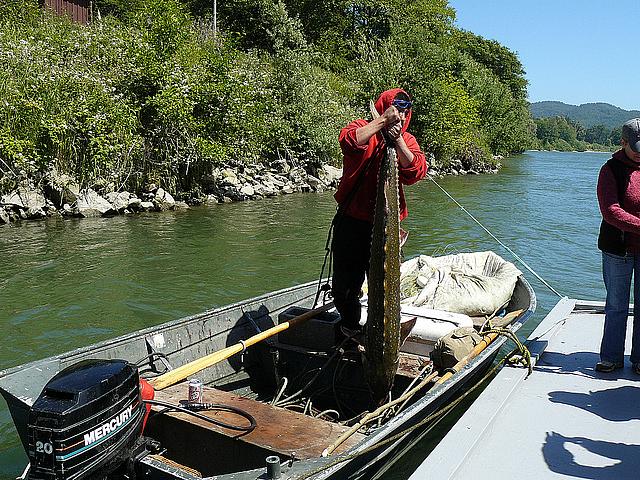In isolated Native American community, a rash of suicides among young men

A member of the Yurok tribe pulls in a sturgeon on Northern California's Klamath River.
The Yurok, California’s largest Native American tribe, recently submitted an emergency declaration to Gov. Jerry Brown and the federal government in response to a rash of suicides among the tribe’s young men. During the last 18 months, the tribe has seen at least eight suicides of men in their late teens and early 20s. The contributing factors to these deaths remain complex and largely opaque, but the frequency of suicides appears to be increasing.
I recently spoke with the tribe’s public relations manager, Matt Mais, who explained that tribal leaders are taking a variety of approaches in attempting to identify both the factors leading to these suicides as well as possible approaches to addressing the problem.
Most of the deaths have centered around the small, unincorporated community of Weitchpec, a Yurok village site located in a remote eastern corner of the tribe’s 84,714-mile reservation. Floods recently washed out the main access road to the community, leaving residents largely isolated from the majority of tribal services offered in the town of Klamath, which is now accessible to Weitchpec residents only by boat or via a two-hour drive over the rugged Bald Hills Road.
This is a region and a community fraught with chronic unemployment, poverty and substance abuse. Many locals don’t own cars, making access to health care and other key services even more problematic.
In reporting on this situation, I plan on spending time in Weitchpec interviewing the families who have lost their sons, brothers and cousins. I also plan to speak with tribal leaders about their efforts to address the problem. In response to these suicides, the tribe is working to improve access to traditional activities such as the tribal sweat lodge. I would like to explore the history and cultural significance of these traditional activities and even experience them myself, if possible.
The tribe is also working with social services and labor leaders to improve employment opportunities for tribe members. I would like to speak with members of the Tribal Council and sit in on at least one council meeting, and I intend to visit both the tribal headquarters in Klamath and the tribal services office in Weitchpec to better understand the community and the services offered.
In broader terms, I’d also like to explore the impact of modernization on the tribe. For countless generations, the Yurok people were self-sufficient, relying on the Klamath and Trinity rivers for sustenance and relying on each other for health care and community. Now the tribe has access to cutting-edge medical care through United Indian Health Services, and yet depression and substance abuse run rampant, their health outcomes are among the worst in the state, and in the latest development men have been killing themselves at the very dawn of their adult lives.
I’ll write a series of stories exploring these topics and themes through interviews, direct interactions with tribe members, photography and possibly video. My initial story would likely focus on the experiences of the families who have lost their loved ones. I’d like to visit them in Weitchpec to see their living conditions personally, and I’d like to hear them describe their departed family members.
Follow-up stories will likely focus on such issues as tribal resources, the tribal leadership’s response to this emergency, the significance and impact of declaring an emergency and the historical and cultural context of the tribe’s current social and economical conditions.
I should also be able to harness the Lost Coast Outpost’s social media presence, which includes more than 50,000 Facebook fans and allows us to serve as a community message board of sorts. We could set up a separate page to engage with tribal members and allow them to engage with each other while focusing on the issue of suicides.
I will also speak with the leaders of the California Center for Rural Policy, a research center based at Humboldt State University that has taken a research-based approach to influencing public policy. And I will talk to leaders from our other local tribes, including the Wiyot and Hupa, to see if they’ve experienced any of the same difficulties.
As a news website we have the ability to publish stories that include video, maps and interactive digital features. Our parent company, Lost Coast Communications, owns three of our county’s most popular radio stations, and we have collaborated on stories in the past to reach a broad audience. My editor and I are also hoping to co-publish stories in this series with a Native-focused outlet such as News From Indian Country or Native Health News Alliance.
[Photo by docentjoyce via Flickr.]
